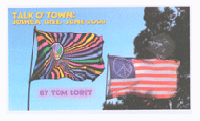Soapbox: What's religion got to do with it?
Tom Loret | Twentynine Palms | Hi-Desert Star opinion page | Posted: Saturday, June 25, 2011
Whenever America’s most celebrated author, Mark Twain, was asked about his faith and religion he often used the words found in “Pudd’nhead Wilson,” “Faith is believing what you know ain’t so.” This quip may qualify him as one of our first bona fide myth busters but like any other amateur, he lacked the data — until now.
We are led to believe, for example, that faith and religion are socially beneficial, that it lowers the violence of rape, murder and suicide and that it tempers juvenile misconduct. However, according to research published in the U.S. academic journal Religion and Society and as reported by The Times U.K., the opposite may be true.
Eighteen of the most prosperous democracies in the world were studied. In those countries at least 60 percent of the population accepts evolution as fact and only 10 to 30 percent believe in God. It is nearly reverse in the U.S., where a base of 60 percent do not accept evolution and anywhere from 50 to 80 percent believe in God.
The results show that in general, higher rates of belief in and worship of a creator correlate with higher rates of homicide, rape, robbery, juvenile mortality, STD infections, teen pregnancy and abortion. As example, America’s murder rate is five to ten times higher and its rate of sexually transmitted diseases nearly 300 times higher than in secular societies; and our rates of divorce, substance abuse, social and economic inequality are off the charts. It concluded that because of the strong correlation between faith and antisocial behavior, there is reason to suppose that religious belief actually does more harm than good.
When church attendance in our county and country is at an all-time high, the question becomes, Why? One pastor, the Rev. Fitzgerald of San Bernardino, said that his congregation had grown by 20 percent since the recession began: “When people are struggling, they’re less distracted by material things and often yearn for more of a connection with God…. They realize there’s something more valuable: family, friends and church, places they can go to where they can feel loved and supported” (reported in the Press-Enterprise).
But from the social scientist’s perspective there is a greater likelihood that religion leads to antisocial behavior because blind faith creates a loss of intellectual curiosity and an inability to reason. Believers often have less respect for others who do not share their faith and feel less responsibility for the general welfare. The health of the nation is further compromised in the area of human sexuality, where a lack of credible health care and education leads to misguided and socially irresponsible acts. Beliefs can also isolate and alienate the believer from society since they do not place importance in the world we share, but in their own private rewards gained through faith.
Another myth that suffers a similar misconception goes back to 1981 when Ronald Reagan and the Moral Majority swept into power on the cry, “Government isn’t the solution, it’s the problem.” Some of us thought, “Since when does a government of the people, by the people, and for the people become the problem, and to who?” The golden age of Made-in-America, common prosperity, civil rights, equal justice and fair taxation came to an end, was dismantled and sold for scrap.
Less prejudiced scientists simply explain that when food is plentiful, citizens have excellent health care, good jobs, affordable housing, access to education and peace of mind — crimes diminish and beliefs give way to a sense of self-respect and mutual well-being where gods need not apply.
